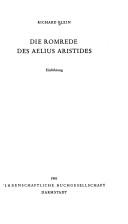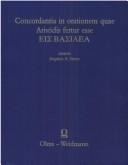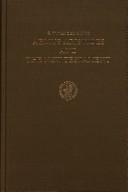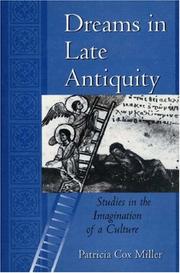| Listing 1 - 9 of 9 |
Sort by
|

ISBN: 3534085825 3534080599 Year: 1983 Publisher: Darmstadt Wissenschaftliche Buchgesellschaft
Abstract | Keywords | Export | Availability | Bookmark
 Loading...
Loading...Choose an application
- Reference Manager
- EndNote
- RefWorks (Direct export to RefWorks)
Classical Greek literature --- 1 <38> AELIUS ARISTIDES --- 937.07 --- #BIBC:bibl.Reekmans --- Griekse filosofie--AELIUS ARISTIDES --- Geschiedenis van Rome: constitutioneel keizerrijk van Augustus tot de soldatenkeizers--(31 v. Chr.-284 n. Chr.) --- 937.07 Geschiedenis van Rome: constitutioneel keizerrijk van Augustus tot de soldatenkeizers--(31 v. Chr.-284 n. Chr.) --- 1 <38> AELIUS ARISTIDES Griekse filosofie--AELIUS ARISTIDES --- Aristides, Publius Aelius --- 871-5 --- Latijnse literatuur: redevoering; preek --- Aristides, Aelius --- Ailios Aristeides --- Aristeides, Ailios --- Aristide, Elio --- Aristides, Elio --- Aristide, Aelius --- Aelius Aristides --- Pseudo-Aelius Aristides --- Rome. --- 871-5 Latijnse literatuur: redevoering; preek --- Aristides --- Aelius Aristide --- Aristides, Aelius. --- Aristide --- Aristides, Publius Aelius. --- Rim --- Roman Empire --- Roman Republic (510-30 B.C.) --- Romi (Empire) --- Byzantine Empire --- Rome (Italy) --- Ailios Aristeidēs --- Aristeidēs, Ailios --- Aristides, P. Aelius --- Ἀριστείδης, Αἴλιος --- Αἴλιος Ἀριστείδης

ISBN: 3487078740 9783487078748 Year: 1987 Volume: 17 Publisher: Hildesheim: Olms,
Abstract | Keywords | Export | Availability | Bookmark
 Loading...
Loading...Choose an application
- Reference Manager
- EndNote
- RefWorks (Direct export to RefWorks)
Greek language --- Glossaries, vocabularies, etc --- Aristides, Aelius --- Concordances --- -Classical languages --- Indo-European languages --- Classical philology --- Greek philology --- -Ailios Aristeides --- Aristeides, Ailios --- Aristides, Publius Aelius --- Aristide, Elio --- Aristides, Elio --- Aristide, Aelius --- Aelius Aristides --- Pseudo-Aelius Aristides --- -Glossaries, vocabularies, etc --- -Concordances --- -Aristides --- Aelius Aristide --- Aristides --- Aristides, Aelius. --- Concordances. --- Greek language - Glossaries, vocabularies, etc --- Aristides, Aelius - Eis basilea - Concordances --- Aristides, Aelius - Eis basilea
Book
ISBN: 9781463202323 Year: 2013 Publisher: Piscataway, NJ : Gorgias Press,
Abstract | Keywords | Export | Availability | Bookmark
 Loading...
Loading...Choose an application
- Reference Manager
- EndNote
- RefWorks (Direct export to RefWorks)
Religion --- History. --- Asklepios --- Cult. --- Religious history --- History --- Asklepios (Greek deity) --- Aristides, Publius Aelius --- Aristides --- Aristides, Aelius --- Aelius Aristide --- Aristide --- Criticism and interpretation. --- Ailios Aristeidēs --- Aristeidēs, Ailios --- Aristide, Elio --- Aristides, Elio --- Aristide, Aelius --- Aelius Aristides --- Aristides, P. Aelius --- Ἀριστείδης, Αἴλιος --- Αἴλιος Ἀριστείδης --- Pseudo-Aelius Aristides
Book
ISBN: 3110456451 3110457393 3110455749 3110457407 Year: 2017 Publisher: Berlin/Boston De Gruyter
Abstract | Keywords | Export | Availability | Bookmark
 Loading...
Loading...Choose an application
- Reference Manager
- EndNote
- RefWorks (Direct export to RefWorks)
Die Hieroi Logoi des mysischen Rhetors Aelius Aristides werden in dieser Studie vor dem Hintergrund einer reichen Tradition von Texten der griechisch-römischen Traumliteratur neu beleuchtet. Behandelt werden einerseits einschlägige Äußerungen sowie Traktate aus dem Bereich der Traumtheorie und -deutung, andererseits literarische Traum- und Visionsschilderungen. Im Zuge der Interpretation der Hieroi Logoi des Aristides führen exemplarische Analysen einzelner Traumerzählungen mithilfe von Methoden, die uns die antike Traumdeutungsliteratur an die Hand gibt, zu der in der Forschung erstmalig angestellten Beobachtung, dass es sich bei nicht wenigen der untersuchten Traumberichte um allegorisch verschlüsselte Beschreibungen initiatorischer Erlebnisse handelt. Aristides erweist sich als ein tief in den Grundgedanken antiker Mysterien verwurzelter Redner, der die Hieroi Logoi für den aufmerksamen Leser, der zugleich das Ideal des gebildeten Menschen, des pepaideuménos, so verkörpert, dass er auch entlegene literarische Anspielungen zu erkennen vermag, zu einem Initiationsitinerar werden lässt, auf dem er gemeinsam mit dem Autor wiederholt die Höhen und Tiefen von Todesgefahr und Errettung durch göttliche Intervention durchschreitet. The highly metaphorical language that is used in the dream narratives of the Hieroi Logoi written by the Mysian orator Aelius Aristides has hitherto hardly been assessed in a manner adequate to its depth. In her interpretation of this text that turns out to be heavily loaded with religious meaning, the author of the present monograph deploys an allegorical approach that emerges from her analyses of relevant oneirocritical texts and literature.
Allegorie. --- Dream. --- Inkubation. --- Traum. --- allegory. --- incubation. --- HISTORY / Ancient / Rome. --- Aristides, Aelius --- Aristides, Aelius. --- Aristides --- Aelius Aristide --- Aristide --- Criticism and interpretation. --- Ailios Aristeidēs --- Aristeidēs, Ailios --- Aristides, Publius Aelius --- Aristide, Elio --- Aristides, Elio --- Aristide, Aelius --- Aelius Aristides --- Aristides, P. Aelius --- Ἀριστείδης, Αἴλιος --- Αἴλιος Ἀριστείδης --- Pseudo-Aelius Aristides --- Dream --- allegory --- incubation
Book
ISBN: 9789004172043 9004172041 9786613061348 9047425367 1283061341 9789047425366 Year: 2008 Volume: 33 Publisher: Boston Brill
Abstract | Keywords | Export | Availability | Bookmark
 Loading...
Loading...Choose an application
- Reference Manager
- EndNote
- RefWorks (Direct export to RefWorks)
Wealthy, conceited, hypochondriac (or perhaps just an invalid), obsessively religious, the orator Aelius Aristides (117 to about 180) is not the most attractive figure of his age, but because he is one of the best-known -- and he is intimately known, thanks to his Sacred Tales -- his works are a vital source for the cultural and religious and political history of Greece under the Roman Empire. The papers gathered here, the fruit of a conference held at Columbia in 2007, form the most intense study of Aristides and his context to have been published since the classic work of Charles Behr forty years ago.
Sophists (Greek philosophy) --- Sophistes grecs --- Congresses --- Congrès --- Aristides, Aelius --- Criticism and interpretation --- Congresses. --- Gods, Greek. --- Gods, Roman. --- Aristides, Aelius -- Criticism and interpretation -- Congresses. --- Languages & Literatures --- Greek & Latin Languages & Literatures --- Congrès --- Aristides --- Aelius Aristide --- Aristide --- Aristides, Publius Aelius --- Ailios Aristeidēs --- Aristeidēs, Ailios --- Aristide, Elio --- Aristides, Elio --- Aristide, Aelius --- Aelius Aristides --- Aristides, P. Aelius --- Ἀριστείδης, Αἴλιος --- Αἴλιος Ἀριστείδης --- Pseudo-Aelius Aristides

ISBN: 9004063846 9004078444 9789004063846 Year: 1986 Publisher: Leiden: Brill,
Abstract | Keywords | Export | Availability | Bookmark
 Loading...
Loading...Choose an application
- Reference Manager
- EndNote
- RefWorks (Direct export to RefWorks)
Speeches, addresses, etc., Greek --- Aristides, Aelius --- -Greek orations --- Greek speeches --- -Ailios Aristeides --- Aristeides, Ailios --- Aristides, Publius Aelius --- Aristide, Elio --- Aristides, Elio --- Aristide, Aelius --- Aelius Aristides --- Pseudo-Aelius Aristides --- -Translations into English --- -Speeches, addresses, etc., Greek --- -Aristides --- Aelius Aristide --- Aristides --- Translations into English --- Translations into English. --- Aristide --- Classical Greek literature --- Ailios Aristeidēs --- Aristeidēs, Ailios --- Aristides, P. Aelius --- Ἀριστείδης, Αἴλιος --- Αἴλιος Ἀριστείδης --- Speeches, addresses, etc., Greek - Translations into English --- Aristides, Aelius - Translations into English

ISBN: 9004060545 9789004060548 9004672354 9789004672352 Year: 1980 Volume: v. 6 Publisher: Leiden ;Boston Brill
Abstract | Keywords | Export | Availability | Bookmark
 Loading...
Loading...Choose an application
- Reference Manager
- EndNote
- RefWorks (Direct export to RefWorks)
Aristides, Aelius --- Bible. --- Influence --- Criticism and interpretation --- Religion --- Bible --- 225.08*8 --- Theologie van het Nieuwe Testament: relatie met de klassieke oudheid --- -Aristides, Aelius --- -Ailios Aristeides --- Aristeides, Ailios --- Aristides, Publius Aelius --- Aristide, Elio --- Aristides, Elio --- Aristide, Aelius --- Aelius Aristides --- Pseudo-Aelius Aristides --- Criticism and interpretation. --- Religion. --- Influence. --- -Criticism and interpretation --- 225.08*8 Theologie van het Nieuwe Testament: relatie met de klassieke oudheid --- -Aristides --- Aelius Aristide --- Aristides --- Aristide --- Ba-yon Tipan --- Bagong Tipan --- Jaji ma Hungi --- Kainē Diathēkē --- New Testament --- Nouveau Testament --- Novo Testamento --- Novum Testamentum --- Novyĭ Zavet --- Novyĭ Zavi︠e︡t Gospoda nashego Īisusa Khrista --- Novyĭ Zavit --- Nuevo Testamento --- Nuovo Testamento --- Nye Testamente --- Perjanjian Baru --- Dhamma sacʻ kyamʻʺ --- Injīl --- Ailios Aristeidēs --- Aristeidēs, Ailios --- Aristides, P. Aelius --- Ἀριστείδης, Αἴλιος --- Αἴλιος Ἀριστείδης --- Aristides, Aelius - Criticism and interpretation --- Aristides, Aelius - Religion

ISBN: 0691074224 9780691074221 0691058350 0691215855 Year: 1994 Publisher: Princeton: Princeton university press,
Abstract | Keywords | Export | Availability | Bookmark
 Loading...
Loading...Choose an application
- Reference Manager
- EndNote
- RefWorks (Direct export to RefWorks)
Dream interpretation was a prominent feature of the intellectual and imaginative world of late antiquity, for martyrs and magicians, philosophers and theologians, polytheists and monotheists alike. Finding it difficult to account for the prevalence of dream-divination, modern scholarship has often condemned it as a cultural weakness, a mass lapse into mere superstition. In this book, Patricia Cox Miller draws on pagan, Jewish, and Christian sources and modern semiotic theory to demonstrate the integral importance of dreams in late-antique thought and life. She argues that Graeco-Roman dream literature functioned as a language of signs that formed a personal and cultural pattern of imagination and gave tangible substance to ideas such as time, cosmic history, and the self. Miller first discusses late-antique theories of dreaming, with emphasis on theological, philosophical, and hermeneutical methods of deciphering dreams as well as the practical uses of dreams, especially in magic and the cult of Asclepius. She then considers the cases of six Graeco-Roman dreamers: Hermas, Perpetua, Aelius Aristides, Jerome, Gregory of Nyssa, and Gregory of Nazianus. Her detailed readings illuminate the ways in which dreams provided solutions to ethical and religious problems, allowed for the reconfiguration of gender and identity, provided occasions for the articulation of ethical ideas, and altogether served as a means of making sense and order of the world.
Christian literature, Early --- Civilization, Greco-Roman --- Classical literature --- Dreams in literature --- Philosophy, Ancient --- Littérature chrétienne primitive --- Civilisation gréco-romaine --- Littérature ancienne --- Rêves dans la littérature --- Philosophie ancienne --- History and criticism --- Histoire et critique --- Imagination --- Psychological aspects --- -Dreams in literature --- -Civilization, Greco-Roman --- -Imagination --- #GOSA:II.P.AU.1 --- #GOSA:II.P.AU.3 --- Imagery, Mental --- Images, Mental --- Mental imagery --- Mental images --- Educational psychology --- Intellect --- Psychology --- Reproduction (Psychology) --- Literature, Classical --- Literature --- Literature, Ancient --- Greek literature --- Latin literature --- Ancient philosophy --- Greek philosophy --- Philosophy, Greek --- Philosophy, Roman --- Roman philosophy --- Greco-Roman civilization --- Civilization, Classical --- Early Christian literature --- Patristic literature --- Civilization, Greco-Roman. --- Dreams in literature. --- Imagination. --- Philosophy, Ancient. --- History and criticism. --- Psychological aspects. --- Littérature chrétienne primitive --- Civilisation gréco-romaine --- Littérature ancienne --- Rêves dans la littérature --- Classical literature - History and criticism --- Christian literature, Early - History and criticism --- Classical literature - Psychological aspects --- Filosofía antigua. --- Sueños en la literatura. --- Literatura clásica. --- Aelius Aristides. --- Apuleius. --- Artemidorus. --- Augustine. --- Berakoth. --- Christ. --- Cicero. --- Galen. --- Hermas. --- Homer. --- Irenaeus. --- Jerome. --- Lucian of Samosata. --- Macrobius. --- Montanism. --- Neoplatonism. --- Origen. --- Ovid. --- Pausanias. --- Penelope. --- Plotinus. --- Plutarch. --- Porphyry. --- Selene. --- Socrates. --- Thecla, St. --- Virgil. --- angels. --- binarism. --- daemons. --- demons. --- enupnion. --- eros. --- fate. --- imagination. --- incubation. --- medicine. --- oneiros. --- semiotics. --- visio.
Book
ISBN: 9780691240244 Year: 2021 Publisher: Princeton, NJ
Abstract | Keywords | Export | Availability | Bookmark
 Loading...
Loading...Choose an application
- Reference Manager
- EndNote
- RefWorks (Direct export to RefWorks)
In Roman Eyes, Jas Elsner seeks to understand the multiple ways that art in ancient Rome formulated the very conditions for its own viewing, and as a result was complicit in the construction of subjectivity in the Roman Empire. Elsner draws upon a wide variety of visual material, from sculpture and wall paintings to coins and terra-cotta statuettes. He examines the different contexts in which images were used, from the religious to the voyeuristic, from the domestic to the subversive. He reads images alongside and against the rich literary tradition of the Greco-Roman world, including travel writing, prose fiction, satire, poetry, mythology, and pilgrimage accounts. The astonishing picture that emerges reveals the mindsets Romans had when they viewed art--their preoccupations and theories, their cultural biases and loosely held beliefs. Roman Eyes is not a history of official public art--the monumental sculptures, arches, and buildings we typically associate with ancient Rome, and that tend to dominate the field. Rather, Elsner looks at smaller objects used or displayed in private settings and closed religious rituals, including tapestries, ivories, altars, jewelry, and even silverware. In many cases, he focuses on works of art that no longer exist, providing a rare window into the aesthetic and religious lives of the ancient Romans.
Arts, Classical. --- Visual perception. --- Aesthetics, Roman. --- Roman aesthetics --- Optics, Psychological --- Vision --- Perception --- Visual discrimination --- Classical arts --- Psychological aspects --- Adoration. --- Aelius Aristides. --- Aeschylus. --- Agalmatophilia. --- Anchises. --- Ancient Greek art. --- Ancient Rome. --- Anecdote. --- Anthropomorphism. --- Apuleius. --- Art history. --- Atargatis. --- Bathing. --- Bibliography. --- Capitoline Museums. --- Castration. --- Christian apologetics. --- Conflation. --- Cooling. --- Cult image. --- Cupid and Psyche. --- De Dea Syria. --- Deity. --- Diana and Actaeon. --- Drapery. --- Ekphrasis. --- Epigram. --- Epithet. --- Eroticism. --- Genre. --- Greco-Roman world. --- H II region. --- Hagiography. --- Hare Krishna (mantra). --- Harpocrates. --- Hellenization. --- Hierapolis. --- Hieros gamos. --- Hydrogen line. --- Iconography. --- Illustration. --- In the Water. --- Indulgence. --- Initiation. --- Ionic Greek. --- Ionization. --- Late Antiquity. --- Leucippe and Clitophon. --- Libation. --- Mimesis. --- Narrative logic. --- Narrative. --- Neo-Attic. --- Number density. --- Oculus. --- Our Choice. --- Parody. --- Philostratus. --- Photon. --- Piety. --- Poetry. --- Polytheism. --- Posture (psychology). --- Praxiteles. --- Procession. --- Pubic hair. --- Putto. --- Queen of Heaven. --- Reionization. --- Religion and sexuality. --- Religious image. --- Rite. --- Roman art. --- Satire. --- Sculpture. --- Second Sophistic. --- Self-consciousness. --- Sensibility. --- Serapis. --- Sexual intercourse. --- Sincerity. --- Social reality. --- Sophist (dialogue). --- Sophistication. --- Star formation. --- Subjectivity. --- Temperature. --- The Golden Ass. --- The Last Sentence. --- The Sea Monster. --- Theatricality. --- Venus Anadyomene. --- Verisimilitude (fiction). --- Verisimilitude. --- Viewing (funeral). --- Voluptas. --- Voyeurism. --- Vulva. --- Writing. --- Zeuxis. --- Romans --- Aesthetics. --- Religious life.
| Listing 1 - 9 of 9 |
Sort by
|

 Search
Search Feedback
Feedback About UniCat
About UniCat  Help
Help News
News